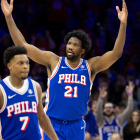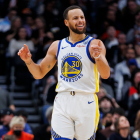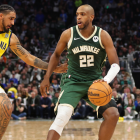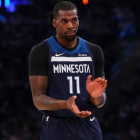TORONTO -- Danny Green was surprised to learn a reporter had targeted him for a Toronto Raptors story. It was a reasonable reaction. Green will not be an All-Star next month and he is the Raptors' seventh-leading scorer. Acquired with Kawhi Leonard last July, he is obviously not their biggest addition.
"Me, why?" he asked.
One answer: While Green is a role player, he is an incredibly important one on the team with the NBA's best record, and his success says something meaningful about what is happening in Toronto with new coach Nick Nurse in charge. A shorter answer: he is genuinely, visibly happy to be there.
Nurse estimated it took Green "about 24 hours" to get over being traded, telling CBS Sports that his leadership has been the best part of having him around. The 31-year-old wing also happens to be in the middle of his most efficient season in four years, making 41 percent of his 3-pointers and leading the entire league in plus-minus.
Part of Green's reinvigoration is the simple fact that he's healthy. He played through a groin injury last season and spent much of his summer rehabbing it. Dating back to training camp, though, whenever Green was asked what was different in Toronto, he used the word freedom. The Raptors' offensive system demands improvisation, and Green told CBS Sports that this has "a ton" to do with the year he's having.
"It gives you more confidence as a player to be able to play your game," Green said. "I think knowing that you're not coming out because of a mistake or because you tried to be creative or make a play or do something outside of your box, it allows you to have that freedom. It makes you more comfortable doing those things."
This made the transition to Toronto "very easy" for the 10-year veteran, and that is no small thing given that he played 15,942 minutes in 620 games for the Spurs, including their yearly playoff runs. He sacrificed money to re-sign with the Spurs in 2015, a year after his lights-out shooting and stout defense helped them beat the Heat in the NBA Finals. Five days removed from his return to San Antonio, which featured a tribute video and many, many hugs, Green was careful to say that his current situation isn't better or worse than his previous one. He did, however, describe it as "different."
Green loves that Toronto wants to play with pace. Anyone who gets a defensive rebound is encouraged to push the ball, and Green takes pride in knocking down transition 3s. He studied the Raptors' playbook in the summer, worked out with teammates in Los Angeles and "started playing and started being more free" in open runs in Toronto in September.
That time of year, however, scrimmages are always loose. The weird part is that things stayed that way.
"When we started to play in-season, it was very similar to open gym," Green said. "Just more structured."
In San Antonio, it was not unusual for coach Gregg Popovich to call a timeout less than two minutes into a game to chastise his team. Green often got the worst of it. "Obviously, I was held to a very high standard there, regardless of years and age," he said, and he believes this was because Popovich knew he was tough enough to take it. This doesn't happen in Toronto, which Green said is "a lot less stressful." He has told Nurse, though, that he'll be ready if the coaching staff ever needs to make an example of someone. He asks for clips of his mistakes.
The Spurs have been called the league's gold standard in terms of professionalism and culture so many times that it has become trite to talk about it. To Green, though, this was so ingrained that it was sort of shocking to find out other organizations could be "really good, too." In this respect, his time in Toronto has been better than expected.
"They know what they're doing," Green said. "They're doing a great job, and family-oriented. They did a great job of making me feel at home."
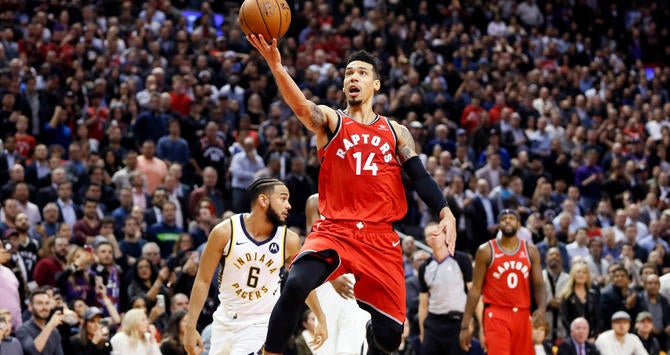
Unlikely as it sounds, there was a time when Nurse was a taskmaster. Grand View College, in his home state of Iowa, hired him at 23 years old, and he did what was expected in what he called "the old days, the stone ages" of the early 90s. He was rigid, and so was his offense.
"This was the only way there is to do things," Nurse said. "Pass A to Pass B to Pass C."
Nurse went to England to coach the Birmingham Bullets in 1995, and he found that working with professionals suited him more. He asked players for input, and he watched NBA film with them on the bus.
"I read a couple books on democratic coaching," Nurse said. "It sunk in, fit what I was doing at the time."
Nurse made his relationship with his players "quasi-autocratic," he said with a laugh. He is the boss, but he wants to hear their opinions and know what they see on the court. Sometimes, at shootaround, Raptors players will ask him about matchups and lineups only to be told he doesn't know yet. He wants them to be organized but doesn't want them to burn their mental energy thinking about strategy on game day.
The Raptors have some set plays, designed to get Leonard the ball or Kyle Lowry a shot or Jonas Valanciunas a post touch. More often, though, the only scripted part of an offensive possession is the beginning of it. Green likes the fact that everyone is essentially allowed to do everything.
"Most guys in this league are very good at everything," Green said. "They did it all in high school and some in college. It's just coming [to the NBA], they get a specific role or a unique talent, something they're great at. People tell 'em, 'Just do that.'"
Occasionally, Nurse wonders if he should be more meticulous. He spent six years coaching in what was then known as the D-League. When you lose the MVP right before the playoffs three separate times, you will be conditioned to be adaptable.
"Most of the places I came from, you gotta do a lot of gunslinging or coaching by the seat of your pants," Nurse said. "Now, there's probably not any CEO in the world that would tell you how to run a business by the seat of your pants. Or, go to the NFL, how meticulous those guys are and how they prepare. I'm trying to almost rein myself in sometimes."
There are nights when Nurse senses his players would rather have everything lined up for them: "I've got this big menu, could you just order for me once in a while?" He sees this as an inevitable result of "the biorhythms of the day" and an unforgiving schedule. After Toronto's recent loss in San Antonio -- the one with the hugs and the tribute video -- guard Fred VanVleet told reporters that the team needed to be more disciplined. Nurse publicly blamed himself.
Empowering the players does not look so great when those players are impatient, disconnected or sloppy. Nurse is willing to live with the occasional rough night, though, the same way he can live with a player turning it over when trying to expand his game. The plan is to get to a point where everybody understands each other's tendencies and the foundation of the offense well enough that they can find their flow under playoff pressure.
In the Raptors' best moments, they make it look like there's more structure than there really is. Green is far from the only one who enjoys this -- Norman Powell said he feels like he can "go out there and just play;" C.J. Miles said it allows the players to not "turn into robots."
"I get a lot of it from music," Nurse said. "I love jazz and blues, where there's a structure, but a lot of the cool stuff is veering off the page and playing."
Nurse wants the ball to move and everyone to feel involved, but he is not "trying to pull all those levers" to dictate what happens. This Toronto team is more talented than ever before, and it is Nurse's job to maximize it. At the highest level, you must be prepared to freelance.
"Predictability can eventually be defended," Nurse said.
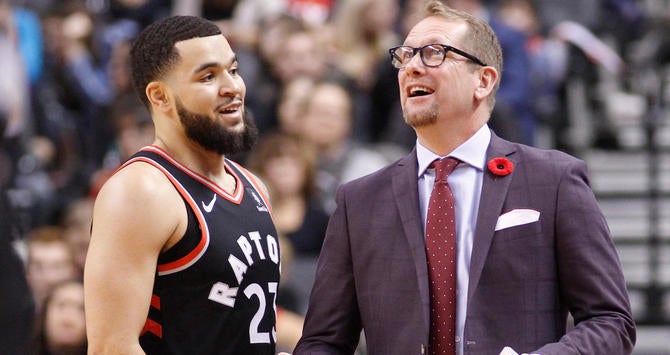
After Toronto's 44th game of the season, Nurse said he wanted the second unit to put in some extra work before and after practices to build some chemistry. Until then, due to his experimentation and various injuries, the Raptors' rotation was so fluid that this wouldn't have made sense. Now they are mostly healthy, which presents a different problem: finding enough time for everybody.
"I feel for him a lot of times because he probably has the toughest job in the league," Green said. "In terms of coaching this team, how much talent we have, there's so many guys that can play. We're so deep. Managing minutes, trying to keep everybody happy and the pressure to win and also to keep guys here, to come back next summer, it's tough, man. But he's doing a great job. I commend him for it."
Nurse is used to coaching players who are striving for more. Everybody employed by the Iowa Energy and the Rio Grande Valley Vipers wants to get out of there, so he had a D-League mantra: Let's just figure out how to get the next one. There were always "more global problems on our team," he said, but those could be dealt with after the more immediate matter of winning the upcoming game. To this day, he tries to be as communicative as he can about playing time, but he knows there will always be some unhappy guys in the post-game locker room.
"There's not enough minutes, they're playing the wrong position, there wasn't enough shots, there wasn't enough food in the postgame locker room," Nurse laughed. "Whatever it is, you gotta try to deal with it the next morning when emotions aren't as high."
On the first day of training camp in Vancouver, Nurse delivered a presentation. During that meeting, he called up Patrick Mutombo, the coaching staff's resident artist, to draw on a whiteboard. Mutombo sketched a cartoon elephant, waving, with a speech balloon saying, "Hi."
If the Raptors were confused, they weren't for long: Nurse wanted them to be able to "say hi to the elephant," as in the proverbial elephant in the room. He had seen NBA teams ignore obvious issues in order to avoid arguments. This is not how you get better; it is how small things fester and become big problems. Nurse encouraged them to come into his office at the practice facility if they ever wanted to talk about anything. There is a figurine of an elephant on his desk.
"If there's not even individual issues … maybe there's some coverage that the team is totally not suited for, we need to come in and bring it to light," Nurse said. "Or we're saying, 'Hey this guy is not doing the coverage and it's affecting everything,' whatever. I think you need to hit all that stuff."
For the most part, Nurse said, the identity of this Toronto team reflects his personality. He believes in being aggressive, creative and fearless in all aspects of the game.
"I think we've shown almost exactly what we want to be at times," Nurse said. "Some real ball pressure and aggression, turning teams over, out and running hard. Things like that. So that's good. It's just managing that through the course of a heavy schedule sometimes, and a lot of injuries."
As always seems to be the case with the Raptors, there is uncertainty about what the future holds. What will Leonard do in the summer? How will they fare in the postseason? How much does the answer to the second question affect the first? As these questions hang in the air, though, look at Green driving-and-kicking to set up Serge Ibaka driving-and-kicking to set up an open 3 for Lowry on which neither of them will get the assist. Listen to Green when he says that teams that win playoff series are not always better, but rather the ones that make the right adjustments. And understand that he is absolutely thrilled to be on this team, playing in this system, for this coach.
"I hope he sticks around as long as I'm here," Green said. "And I hope to stick around."














